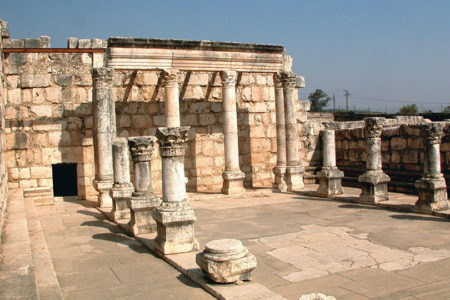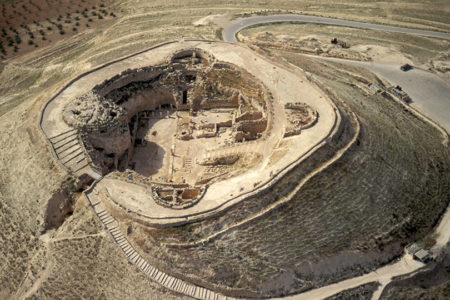God Is Moral Part Eight
Our previous article showed that, historically, governmental law and the Bible regard murder as the willful, premeditated killing of a human being by another. In light of this truth, an issue that must be addressed in the 21st century is this: How does the concept of murder relate to the killing of infants? Are infanticide and abortion murder?
God’s Relationship to Human Procreation, Conception, Development, and Birth
God has a significant relationship to human procreation, conception, development, and birth.
Human Procreation. God created male and female human beings and commanded them to be fruitful, multiply, and fill the earth (Gen. 1:27–28). This command indicated His intention that people use their sexuality to procreate other human beings to populate the planet. Procreate means “to produce (young); beget (offspring).”1 After the flood, God emphasized this intention again by commanding Noah and his descendants to procreate abundantly and fill the earth (9:1, 7).
Conception. God has sovereign authority to control when human conception occurs as a result of sexual union, and when it does not. When King Abimelech innocently took Sarah, Abraham’s wife, as a result of Abraham and Sarah misleading him, God judged the king by preventing the women in his household from conceiving (20:2–5, 18). After Abimelech restored Sarah to Abraham, God healed the women; and they bore children (vv. 14, 17).
God enabled Sarah to conceive and bear a son after she and Abraham were beyond the age for procreation (17:15–19; 18:9–14; 21:1–2). God opened Leah’s womb to conceive children for Jacob (29:31–35). Rachel’s extended barren state prompted Jacob to conclude that God had prevented her from conceiving (30:1–2). Later God opened Rachel’s womb, and she conceived (vv. 22–23). God closed Hannah’s womb for several years (1 Sam. 1:5–7). In response to her prayers, God enabled her to conceive and bear Samuel (vv. 10–11, 19–20).
Development. The Bible identifies God as the maker of people. God promised Abraham, “I will make you exceedingly fruitful; and I will make nations of you” (Gen. 17:6). He said He would make Ishmael “fruitful,…multiply him exceedingly,” and “make him a great nation” (v. 20). God claimed He “gave” Isaac to Abraham and “gave” Jacob and Esau to Isaac (Josh. 24:3–4). He promised to “make” Jacob “fruitful,” to “multiply” him, and to “make” of him “a multitude of people” (Gen 48:4). Jacob testified that God had “given” him children (33:5). God told the people of Israel, “I will…make you fruitful [and] multiply you” (Lev. 26:9).
Job called God “my Maker” (Job 32:22) and asserted God “made” him “in the womb” and made other people (31:15). The psalmist called God “the Lᴏʀᴅ our Maker” (Ps. 95:6). Proverbs calls God a person’s “Maker” (Prov. 14:31; 17:5) and states, “The rich and the poor have this in common, the Lᴏʀᴅ is the maker of them all” (22:2). Isaiah referred to a man looking to “his Maker” and to people who “forget the Lᴏʀᴅ” their “Maker” (Isa. 17:7; 51:13).
The major Hebrew word translated “make,” “made,” and “Maker” in these passages emphasizes “the fashioning of the object….When used of God, the word frequently emphasizes God’s acts in the sphere of history,…effecting his sovereign purpose.”2 Thus these passages imply that, since it is God’s sovereign purpose that children be conceived and born to populate the earth, He personally fashions the development of the conceived child in the womb to bring it to birth.
Thus Job asked, “Did not the same One fashion us in the womb?” (Job 31:15). The psalmist said God’s “hands have made me and fashioned me” (Ps. 119:73). These statements indicate “God’s role in forming the human body is significant.”3 The suffering servant asserted that God “formed” him “from the womb” (Isa. 49:5). God told Jeremiah that He “formed” him “in the womb” (Jer. 1:5). The word translated “formed” in these passages basically refers to “various forms of craftsmanship.”4 In the Old Testament, it is used primarily for “the divine activity of creating and shaping…specific parts of the human body, such as the heart (Ps. 33:15)” and “the eye (Ps. 94:9).”5
David stated God “formed” his “inward parts” (internal organs) and “covered” him (“weaved” or “shaped”6 his body together) in his “mother’s womb” (Ps. 139:13). He indicated that God’s work of making him in the “secret” (“hiding place”7) of his mother’s womb was so “wonderfully” (“set apart”8 as exclusively God’s work) “marvelous” (“beyond human capabilities”9) and “skillfully” (“diversified”10) that it prompted a reverential fear of God (vv. 14–15). God saw David’s “frame” (“bones”11) and his “substance” (“embryo”12) in his mother’s womb before God began to form it into a fully developed body (vv. 15–16). God determined the course of David’s life before he was born (v. 16). This fact indicated God’s intention that nothing prevent David’s birth.
Birth. The Bible reveals that God is actively involved with the birth and delivery of children. Job claimed God “brought” him “out of the womb” (Job 10:18). David declared God “took” him “out of the womb” (Ps. 22:9). The psalmist said God “took me out of my mother’s womb” (71:6), and the apostle Paul said, “God…separated me from my mother’s womb” (Gal. 1:15).
Conclusions. God’s extremely significant relationship to human procreation, conception, development, and birth prompts several conclusions. First, God is the ultimate source (“creator or originator”13) of all human beings. The biblical declaration “children are a heritage [“gift”14] from the Lᴏʀᴅ, the fruit of the womb is a reward” substantiates that conclusion (Ps. 127:3).
Second, a human being is a work of God from the time of conception through birth.
Third, the willful, premeditated killing of an infant at any point from conception through birth and afterward is an attack against a work of God.
Fourth, the willful, premeditated killing of an infant at any point from conception through birth and afterward violates God’s commandment that human beings be fruitful, multiply, and fill the earth.
Definitions of Infanticide
The Oxford English Dictionary defines infanticide as “the custom of killing newborn infants, which prevails among savages, and was common in the ancient world.”15 It is “the crime of murdering an infant after its birth. Perpetrated by or with consent of its parents, esp. the mother.”16
Webster’s New International Dictionary of the English Language defines infanticide as “the killing of a newly or recently born child; the practice of killing infants; child murder.”17
God and Infanticide
In light of our previous conclusions, it should be obvious that God opposes infanticide. In at least two ways, the Bible reveals His opposition.
- When the king of Egypt commanded the killing of all Hebrew, male children immediately after birth, God nullified that infanticide command by causing the Israelites to multiply in greater numbers (Ex. 1:15–22; Acts 7:19).
- God sternly forbade the Israelites to follow the pagan, Gentile practice of offering their children as burnt sacrifices to honor and worship their false gods (Lev. 18:21). Tragically, the people of Israel and some of their kings disobeyed God and adopted this perverted practice of child sacrifice (2 Ki. 16:3; 21:6; Ps. 106:35–38; Ezek. 23:37–39).
Three factors seem to indicate that the victims of these child sacrifices were infants. First, the word translated “children” in Isaiah 57:5, which refers to the practice of “slaying the children,” was “generally used for very young children.”18 Second, the verb form of this word is strongly related to the subject of birth.19 Third, in a context that refers to “burnt offerings,” the question is asked, “Shall I give my firstborn for my transgression, the fruit of my body for the sin of my soul?” (Mic. 6:7). The question seems to indicate that it was primarily infants who were offered as burnt offerings to false gods.
God called child sacrifice evil and an abomination that He hates and that provokes Him to anger (Dt. 12:31; 2 Ki. 21:6; Jer. 32:35). God declared that all who sacrifice their children are an abomination to Him (Dt. 18:10–12). God required the Israelites to execute any Israelite or Gentile living in their land who gave their children for a sacrifice (Lev. 20:1–5).
Child sacrifice had the following consequences for Israel: it polluted the land, defiled those who practiced it, stirred up God’s wrath against the Israelites, caused God to abhor them, and subjected them to enemy rule and desolation (Ps. 106:38–43; Jer. 7:31–34).
Psalm 106:37–38 indicates that child sacrifice to a false god is, in reality, sacrifice to demons (evil, fallen angels who serve Satan). This practice seems to imply that demons desire child sacrifice. If so, then they probably motivate people to sacrifice children. Consequently, those who sacrifice their children or encourage their children to sacrifice themselves in order to honor or worship a “god,” are demonically motivated to honor or worship a false god.
The Bible’s revelation about God’s attitude toward child sacrifice indicates that the God of the Bible does not motivate people to sacrifice their children or encourage their children to sacrifice themselves to honor or worship Him.
ENDNOTES
- Webster’s New World Large Print Dictionary, v. “procreate.”
- Thomas E. McComiskey, “asa,” Theological Wordbook of the Old Testament, R. Laird Harris, Gleason L. Archer, Jr., and Bruce K. Waltke (Chicago: Moody Press, 1980), 2:701.
- John N. Oswalt, “kun,” in Harris et al., 1:433.
- Otzen, “yatsar,” Theological Dictionary of the Old Testament, ed. G. Johannes Botterweck, Helmer Ringgren, trans. David E. Green, translated from Theologisches Worterbuch zum Alten Testament (Grand Rapids: Eerdmans, 1990), 6:258–59.
- Ibid., 260–61.
- D. Patterson, “sakak,” in Harris et al., 2:623.
- D. Patterson, “seter,” in Harris et al., 2:636.
- Victor P. Hamilton, “peloni,” in Harris et al., 2:724.
- Victor P. Hamilton, “pala,” in Harris et al., 2:723.
- Barton Payne, “raqam,” in Harris et al., 2:861.
- Ronald B. Allen, “osem,” in Harris et al., 2:690.
- Earl S. Kalland, “golem,” in Harris et al., 1:165.
- Lipinski,”nahal,” Theological Dictionary of the Old Testament, ed. G. Johannes Botterweck, Helmer Ringgren, and Heinz-Josef Fabry, trans. David E. Green, translated from Theologisches Worterbuch zum Alten Testament (Grand Rapids: Eerdmans, 1998), 9:335.
- Ibid.
- The Oxford English Dictionary, 2nd ed. (Oxford: Clarendon Press, 1989), s.v. “infanticide.”
- Ibid.
- Webster’s New International Dictionary of the English Language, 2nd ed., unabridged, (Springfield, Mass.: G. & C. Merriam Company, 1939), s.v. “infanticide.”
- Paul R. Gilchrist, “yeled,” in Harris et al., 1:379.
- Ibid., 378–79.







